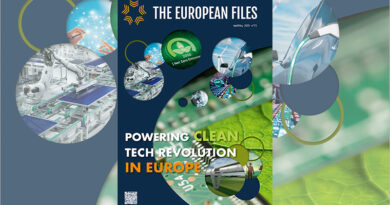
Resource efficiency and circular economy: essential for our economies and our environment
As nations become wealthier, does this necessarily lead to a proportional increase in the weight of the materials they consume? Can economies further boost growth and prosperity while reducing their reliance on materials? These pressing questions lie at the heart of national and international policy discussions about transitioning to a more resource-efficient, circular economy. Moving towards a resource-efficient, circular economy is not an end in itself but rather the means for reducing the environmental impacts of material resource use while improving people’s living standards and promoting new jobs and economic growth.
The business-as-usual on resource material use and disposal is unsustainable
In the last century, an unprecedented increase in natural resources and materials use has occurred in our societies. As the global economy expands and living standards rise, the world’s raw materials consumption is expected to nearly double by 2060 (see Figure 1). This is particularly alarming because materials extraction, processing, use and waste management lead to very significant environmental pressures. These pressures range from local pollution at mining sites to GHG emissions from metal processing to air pollution from waste handling (OECD Global Material Resources Outlook to 2060). By 2060, GHG emissions related to materials management will put twice the pressure on the environment we see today.
The business-as-usual is unsustainable, and these trends need to be reversed. Concrete actions across the entire value chain are required to address environmental challenges related to materials extraction, processing, use and waste management. The transition toward a resource-efficient, circular economy offers an opportunity to help achieve material security while improving environmental and economic outcomes. The level of ambition of national policies and international engagement will determine the extent of the reduction of the environmental impacts linked to material resource production and use.
Ambitious national policies aiming at a resource-efficient, circular economy are needed to support progress towards decoupling economic growth from material use
In addition to the imperative to close leakage pathways by improving waste management systems, the OECD has identified measures that are critical in helping to curb current trends in material use and disposal while protecting the environment and supporting economic growth:
Fiscal instruments. Taxes on primary material resources extraction and use —the revenues of which are used to finance subsidies for product repair and reuse, as well as recycled goods and secondary material production— can be budget neutral while helping protect the environment. Yet, little of this is currently happening and there is significant room for increased ambition in this area, including by eliminating environmentally harmful subsidies. OECD model simulations for 2040 predict that implementing a material fiscal reform would significantly decrease the material intensity of the economy and allow a relative decoupling of primary materials use from economic growth in future years.
Extended Producer Responsibility (EPR). EPR schemes shift the responsibility for waste collection, treatment and disposal from municipalities towards producers. They can also incentivise producers to design their products for subsequent recycling. Doing so supports waste prevention at the source, promotes product design for the environment, and contributes to public recycling and materials management. For certain product groups, EPR schemes are already widely implemented in OECD countries and are generally successful. Yet, governments could further improve EPR performance and expand their use to new product groups. The OECD has produced a number of policy guidance documents supporting these objectives.
Circular economy labels and information schemes (CELIS) can empower market actors —both firms and consumers— to distinguish and discriminate products based on environmental performance. They foster resource-efficient, circular economy activities, such as encouraging the purchase of longer-lived products. Nevertheless, information schemes remain insufficiently developed. Against this context, governments could facilitate methodological advances to support product lifespan criteria. Governments could also further encourage enterprises and industrial sectors to develop information systems to improve resource efficiency along value chains, ensure standardisation and harmonisation, and develop regulatory information disclosure requirements.
International co-operation and coordination are crucial to advancing toward a more resource-efficient, circular economy
The environmental damages generated by the current use and disposal of material resources are harming global commons, such as the climate and oceans, and require international co-operation to resolve. In some sectors, the transition to circularity requires frictionless international trade to allow circular business models to scale up sufficiently and become competitive. In developing countries, the strategic deployment of Official Development Assistance (ODA) can play a central role in facilitating the transition by mainstreaming resource efficiency and material recovery in donors’ programmes and projects.
There are a number of encouraging signs showing that some of this is now beginning to happen. For instance, at the United Nations Environment Assembly, governments have agreed to launch negotiations on the development of a legally binding, global treaty to end plastic pollution. In parallel, OECD data show that there has been a significant increase in development assistance to tackle plastic pollution (OECD Global Plastics Outlook). Other multilateral fora, such as the G20 and the G7, are also actively pushing the resource efficiency agenda, including by exploring ways to alleviate barriers to trade and investment in environmental goods and services. Clearly, further efforts are needed, and the OECD will support these through its evidence-based analytical work.

Shardul Agrawala, Head of the Environment and Economic Integration Division, OECD Environment Directorate



, Junior Environmental Policy Analyst, Environment and Economic Integration Division, OECD Environment Directorate



